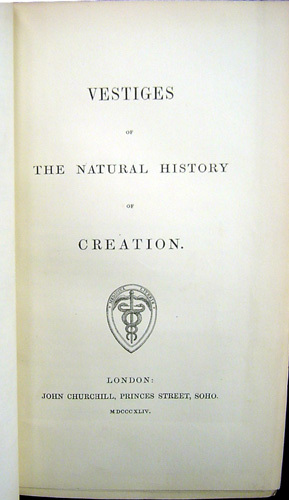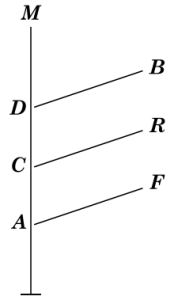Making the First Great Evolutionary Sensation
W ho was "Mr. Vestiges" who first shook the world with his evolutionary thinking?
ho was "Mr. Vestiges" who first shook the world with his evolutionary thinking?
1. The celebrated biological thinker Charles Darwin
2. The Edinburgh journalist Robert Chambers
3. The Engish mathematician and philosopher Charles Babbage
4. Botanist and explorer Joseph Dalton Hooker
And the answer is
Robert Chambers.
Here's the story from The Species Seekers by Richard Conniff:
Evolutionary ideas, first loosely formulated decades earlier by Erasmus Darwin in England and Jean-Baptiste Lamarck in France, among others, were massing beneath the surface during the first half of the 19th century, building up pressure, distorting the surface crust of conventional discourse, flaring up in odd corners of the intellectual world. Then, in October 1844, with the appearance of an anonymous tract called Vestiges of the Natural History of Creation, they burst out onto the public streets, up church aisles, and into coffee shops and gentlemen's clubs. Vestigeswas an almost miraculous work, deeply flawed, brimming over with "dangerous" ideas, and yet wildly popular.

Diagram from the first edition shows a model of development where fish (F), reptiles (R), and birds (B) represent branches from a path leading to mammals (M)
The anonymous "Mr. Vestiges," as the author became known, deftly wove evolution into a sweeping history of the cosmos, beginning in some primordial "fire mist." At the very moment when Darwin thought that admitting to belief in the mutability of species was like "confessing a murder," the anonymous author of Vestiges plainly declared that humans had arisen from monkeys and apes. "In many ways," Darwin scholar James A. Secord writes, "Darwin had been scooped…" Darwin and others in the scientific community soon suspected that the real author was an outsider, the Edinburgh journalist and publisher Robert Chambers. Vestiges was so controversial, however, that his authorship was not acknowledged until after his death in 1871.
Though Vestiges is largely forgotten today, it would alter the course of public opinion, and set both Darwin and an unknown surveyor named Alfred Russel Wallace onto career paths that would converge, years later, in the triumph of evolutionary thinking.





